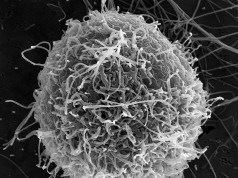VITAMIN E & VITAMIN C: NO IMPACT ON CARDIOVASCULAR DISEASE RISK
Vitamin E and Vitamin C are essential vitamins with powerful antioxidant properties.These vitamins are able to neutralize toxic free radicals, which are normal byproducts of metabolism in our bodies.In theory, antioxidants should be able to prevent these dangerous free radicals from damaging the cells in our body, including the endothelial cells that form the interior lining of our arteries.While previous laboratory studies, typically using human cells growing in a culture dish or laboratory animals, have shown that antioxidant vitamins do indeed soak up free radicals, clinical studies of these vitamins in humans have been far less encouraging (as is often the case in medical research, unfortunately).
Now, a new long-term prospective clinical trial, involving nearly 15,000 male physicians aged 50 and above, is casting further doubt that Vitamin E and Vitamin C supplements are capable of reducing the risk of cardiovascular disease.In this 10-year study, which was conducted at Harvard University, volunteers were randomized to receive a daily Vitamin E pill (400 IU) or an identical sugar pill (placebo), as well as a daily Vitamin C pill (500 mg) or a similarly identical placebo.Unlike many previous cardiovascular disease prevention studies that have evaluated these two vitamins, the vast majority of the Physicians Health Study II volunteers were healthy, and had no clinical evidence of heart disease, peripheral vascular disease, or stroke upon entry into the study (only 5 percent of these volunteers had any evidence of any cardiovascular diseases at the time they joined this research study).This study appears in the current issue of the Journal of the American Medical Association.
I wont belabor the results of this very large high quality clinical study, because the findings were very straightforward and disappointing.There was no significant difference in the incidence of heart disease, heart attacks or strokes between the various randomized groups of male volunteers in this antioxidant vitamin study.Neither Vitamin E nor Vitamin C supplementation appeared to have any favorable impact on the incidence of cardiovascular disease in these otherwise healthy middle-aged male physicians.On the other hand, there was a 74 percent relative increase in the risk of stroke among the men who were randomized to receive Vitamin E.The type of stroke most often observed in the men taking Vitamin E was hemorrhagic (bleeding) stroke, which is not entirely surprising, as Vitamin E can cause thinning of the blood, particularly at higher doses.
In summary, this is yet another disappointing clinical research trial looking for potential health benefits associated with Vitamin E and Vitamin C supplementation.In this particular study, there appeared to be no benefit associated with Vitamin E or Vitamin C in reducing the incidence of heart disease, heart attack or stroke in healthy middle-aged men who took these vitamin supplements for an average of 8 years.Unfortunately, the results of this study mirror the similarly disappointing results of recent prospective Vitamin E and Vitamin C cancer prevention studies which have, likewise, not shown any apparent benefit in reducing the incidence of cancers.Moreover, taking regular supplements of Vitamin E, beyond the current minimum daily recommended requirement, may also increase your risk of hemorrhagic stroke.
This study joins an ever greater collection of clinical research studies that have shown no significant health benefits associated with Vitamin E and Vitamin C supplementation. For folks like me, who have long hoped for different research outcomes related to these two antioxidant vitamins, it may be time to have another look at my vitamin and supplements drawer, and to update my inventory based upon the results of this study.
DOES LACK OF SLEEP INCREASE STROKE & HEART ATTACK RISK IN HYPERTENSIVE PATIENTS?
As I sit at my computer this evening, composing this weeks column, I am struggling to stay awake after a very long week with little sleep.My head is pounding in time with my fingers as they tap on my laptops keys.My eyes dont seem to want to stay in focus, either.Annoying aches in the back of my head and neck nicely round out all of my other symptoms of sleep deprivation.
Its no secret that Americans are sleeping less and less these days.We spend more time at work, and less time in bed, than most other people around the world (we also take fewer vacations than most of the rest of the world).Bleary-eyed, chronically irritable, and perpetually dazed, we trudge through each passing day wishing we could get just an hour or two of additional sleep before being awakened by our alarms each morning.But beyond merely feeling miserable much of the time (or, on a more serious note, risking an automobile accident while driving), there may actually be significant health risks associated with chronic sleep deprivation.Indeed, recent clinical studies have suggested that, for most people, an average of 7 hours of sleep per night may be optimal for good health.Slumbering away for significantly fewer (or more) hours may, in fact, increase a persons risk of serious illness, or even death.
Now, a new study from Japan, where people also tend to get by on much less sleep than the rest of the world does, suggests that chronic sleep deprivation may substantially increase your risk of stroke, heart attack and death due to cardiac events, especially if your blood pressure tends to increase at night while you sleep.This prospective clinical research study, just published in the Archives of Internal Medicine, evaluated 1,255 healthy older adults with uncomplicated high blood pressure. The average age of the volunteers in this study was 70 years (range: 33 to 97 years), and the average duration of patient follow-up was 4 years. Continuous blood pressure readings were performed on these patient volunteers for 24-hour periods at home, on a weekly basis, and all patients were closely followed for signs of heart attack (fatal or non-fatal) and stroke over the duration of the research study.All patient volunteers also maintained a sleep diary on the evenings when their blood pressure was being monitored.
In this study of hypertensive patients, a nightly sleep duration of less than 7.5 hours was associated with nearly twice the risk of experiencing a cardiovascular event (i.e., stroke, non-fatal heart attack, or fatal heart attack) when compared to hypertensive patients who reported more than 7.5 hours of sleep per night.
Other studies, looking primarily at younger and healthier patients, have also noted an increased risk of death (from any cause) when the average nightly duration of sleep drops below 7 hours. This particular study is unique in that the patient volunteers all had high blood pressure, and all of them underwent 24-hour continuous monitoring of their blood pressure. This latter feature is important because nocturnal rises in blood pressure have previously been linked with an increased risk of cardiovascular events, but blood pressure increases at night have not previously been studied in combination with duration of sleep.
When the researchers in this study looked specifically at those patients who experienced a rise in their blood pressure at night, the risk of cardiovascular events associated with sleeping less than 7.5 hours per night increased dramatically. When this group of patient volunteers was compared to patients who slept more than 7.5 hours per night and who had the normal pattern of stable or decreased blood pressure at night, the risk of serious cardiovascular events was more than 4 times as common in the patients with rising blood pressure and sleep durations of less than 7.5 hours.Thus, among older patients with hypertension, increased nocturnal blood pressure and decreased duration of sleep, when combined, were associated with a very high risk of heart attack, death from heart attack, and stroke.
There are some important limitations in this study that should be considered. First of all, none of the patient volunteers in this study were observed in sleep lab, and so the sleep durations reported by the patients are subject to a great deal of inaccuracy. (The most accurate method of determining if patients are asleep or awake is to perform a formal sleep lab study, including the use of continuous EEG recordings of brainwave activity).Secondly, because the study volunteers were not observed by the researchers at night, it is not possible for this research study to determine if the rise in nocturnal blood pressure was, in some way, directly and solely responsible for the increase in cardiovascular events observed in the blood pressure risers who slept less than 7.5 hours per night. In fact, multiple health-related factors are known to cause elevated blood pressure at night, including sleep apnea, some medications, alcohol, obesity, diabetes, and nightmares, among others, and some of these same factors are, themselves, directly associated with an increased risk of cardiovascular events.For example, there is a well-known pattern of nocturnal heart attacks, and many experts believe that sleep apnea is the likely culprit in many such cases. According to this theory, the periods of decreased oxygen flow to the heart that occur when patients with sleep apnea momentarily stop breathing may give rise to heart attacks when coexisting coronary artery disease is also present. (Patients with sleep apnea typically have multiple and asymptomatic apneic episodes throughout the night, and oxygen levels within the blood and vital organs can drop precipitously during these brief spells when breathing stops.)
Therefore, in order to validate the conclusions of this study, the study would have to be repeated under conditions requiring that all patient volunteers undergo formal sleep lab testing in addition to continuous blood pressure monitoring. Nonetheless, there is ample previous research data suggesting that chronic sleep deprivation is associated with a higher risk of serious illness, and with an increased risk of death. So, on that note, Im calling it a night, and Im off to bed now to try and catch some much-needed sleep.
Dr.Wascher is an oncologic surgeon, professor of surgery,a widely published author, andthe Director of the Division of Surgical Oncology at Newark Beth Israel Medical Center:
https://sbhcs.com/hospitals/newark_beth_israel/mservices/oncology/surgical.html
Send your feedback to Dr. Wascher at: rwascher@doctorwascher.net
To read more of Dr. Waschers Health Report columns, please visit his
website at: https://doctorwascher.com
Copyright 2008. Robert A. Wascher, MD, FACS.
All rights reserved.





